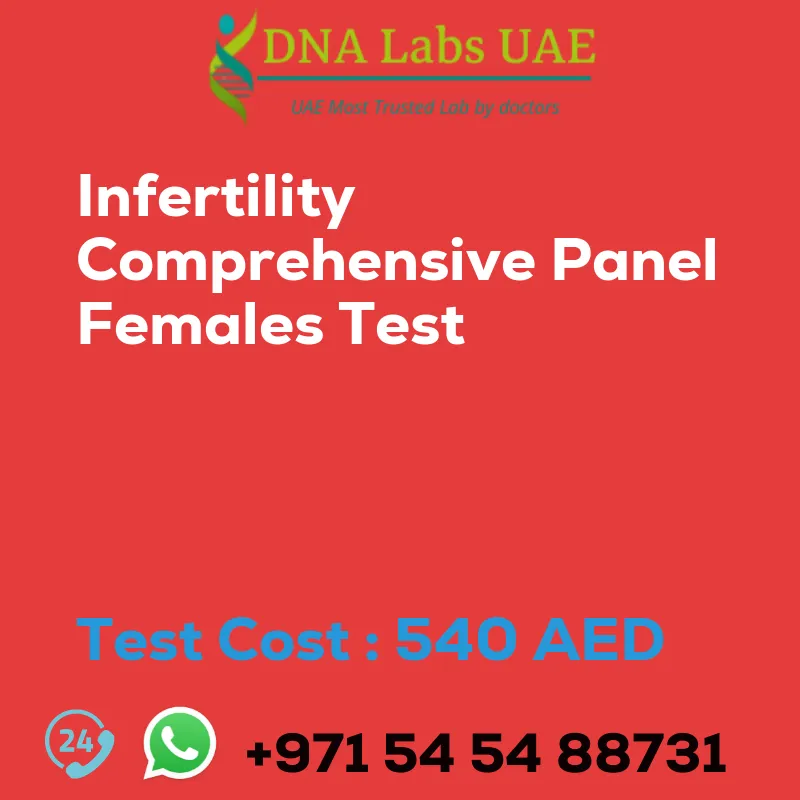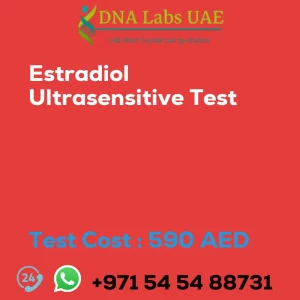INFERTILITY COMPREHENSIVE PANEL FEMALES Test
Test cost: AED 540.0
Test Components:
- FSH
- LH
- Prolactin
- Testosterone, Total
- TSH Ultrasensitive
- Estradiol
- Anti Mullerian Hormone (AMH)
Sample Condition:
4 mL (2 mL min.) serum from 1 SST. Collect specimen 4 hours after the patient has awakened. Overnight fasting is preferred. Ship refrigerated or frozen.
Report Delivery:
Sample Daily by 9 am; Report Same day
Method:
Chemiluminescent Immunoassay, EIA
Test type:
Disorders of Endocrine System, Infertility
Doctor:
Gynecologist, Endocrinologist
Test Department:
Pre Test Information
Overnight fasting is preferred. Collect specimen 4 hours after the patient has awakened. In females, preferred sampling time is Day 2 / Day 3 of the menstrual cycle.
Test Details:
The Infertility Comprehensive Panel for females is a diagnostic test that evaluates various factors that may contribute to infertility in women. This panel typically includes a combination of blood tests, imaging studies, and other diagnostic procedures.
The specific tests included in the panel may vary depending on the healthcare provider and the individual’s specific situation, but commonly included tests are:
- Hormone levels: This may include testing for levels of follicle-stimulating hormone (FSH), luteinizing hormone (LH), estrogen, progesterone, and thyroid hormones. These tests can help assess ovarian function and hormone balance.
- Ovarian reserve testing: This may include measuring levels of anti-Mullerian hormone (AMH) and/or performing an antral follicle count (AFC) via ultrasound. These tests can provide an estimate of a woman’s remaining egg supply.
- Infectious disease screening: This may include tests for sexually transmitted infections (STIs) such as chlamydia, gonorrhea, syphilis, and HIV. These infections can affect fertility and may require treatment.
- Genetic testing: This may include screening for specific genetic disorders that can impact fertility, such as chromosomal abnormalities or mutations in specific genes.
- Imaging studies: This may include transvaginal ultrasound to assess the structure of the uterus, fallopian tubes, and ovaries. Hysterosalpingography (HSG) may also be performed to evaluate the patency of the fallopian tubes.
- Other tests: Additional tests may be included based on individual circumstances, such as tests for autoimmune disorders, clotting disorders, or other underlying medical conditions that can affect fertility.
The Infertility Comprehensive Panel for females aims to identify any potential causes of infertility and guide appropriate treatment options. It is typically performed after a thorough medical history review and physical examination. The results of these tests can help healthcare providers develop a personalized treatment plan to optimize the chances of achieving pregnancy.
| Test Name | INFERTILITY COMPREHENSIVE PANEL FEMALES Test |
|---|---|
| Components | *FSH*LH*Prolactin*Testosterone, Total *TSH Ultrasensitive*Estradiol*Anti Mullerian Hormone (AMH) |
| Price | 540.0 AED |
| Sample Condition | 4 mL (2 mL min.) serum from 1 SST. Collectspecimen 4 hours after the patient has awakened. Overnight fasting ispreferred. Ship refrigerated or frozen. |
| Report Delivery | Sample Daily by 9 am; Report Same day |
| Method | Chemiluminescent Immunoassay, EIA |
| Test type | Disorders of Endocrine System, Infertility |
| Doctor | Gynecologist, Endocrinologist |
| Test Department: | |
| Pre Test Information | Overnight fasting ispreferred. Collectspecimen4hoursafterthe patient has awakened. In females, preferred sampling time is Day 2 / Day 3 of the menstrual cycle. |
| Test Details |
The Infertility Comprehensive Panel for females is a diagnostic test that evaluates various factors that may contribute to infertility in women. This panel typically includes a combination of blood tests, imaging studies, and other diagnostic procedures. The specific tests included in the panel may vary depending on the healthcare provider and the individual’s specific situation, but commonly included tests are: 1. Hormone levels: This may include testing for levels of follicle-stimulating hormone (FSH), luteinizing hormone (LH), estrogen, progesterone, and thyroid hormones. These tests can help assess ovarian function and hormone balance. 2. Ovarian reserve testing: This may include measuring levels of anti-Mullerian hormone (AMH) and/or performing an antral follicle count (AFC) via ultrasound. These tests can provide an estimate of a woman’s remaining egg supply. 3. Infectious disease screening: This may include tests for sexually transmitted infections (STIs) such as chlamydia, gonorrhea, syphilis, and HIV. These infections can affect fertility and may require treatment. 4. Genetic testing: This may include screening for specific genetic disorders that can impact fertility, such as chromosomal abnormalities or mutations in specific genes. 5. Imaging studies: This may include transvaginal ultrasound to assess the structure of the uterus, fallopian tubes, and ovaries. Hysterosalpingography (HSG) may also be performed to evaluate the patency of the fallopian tubes. 6. Other tests: Additional tests may be included based on individual circumstances, such as tests for autoimmune disorders, clotting disorders, or other underlying medical conditions that can affect fertility. The Infertility Comprehensive Panel for females aims to identify any potential causes of infertility and guide appropriate treatment options. It is typically performed after a thorough medical history review and physical examination. The results of these tests can help healthcare providers develop a personalized treatment plan to optimize the chances of achieving pregnancy. |








